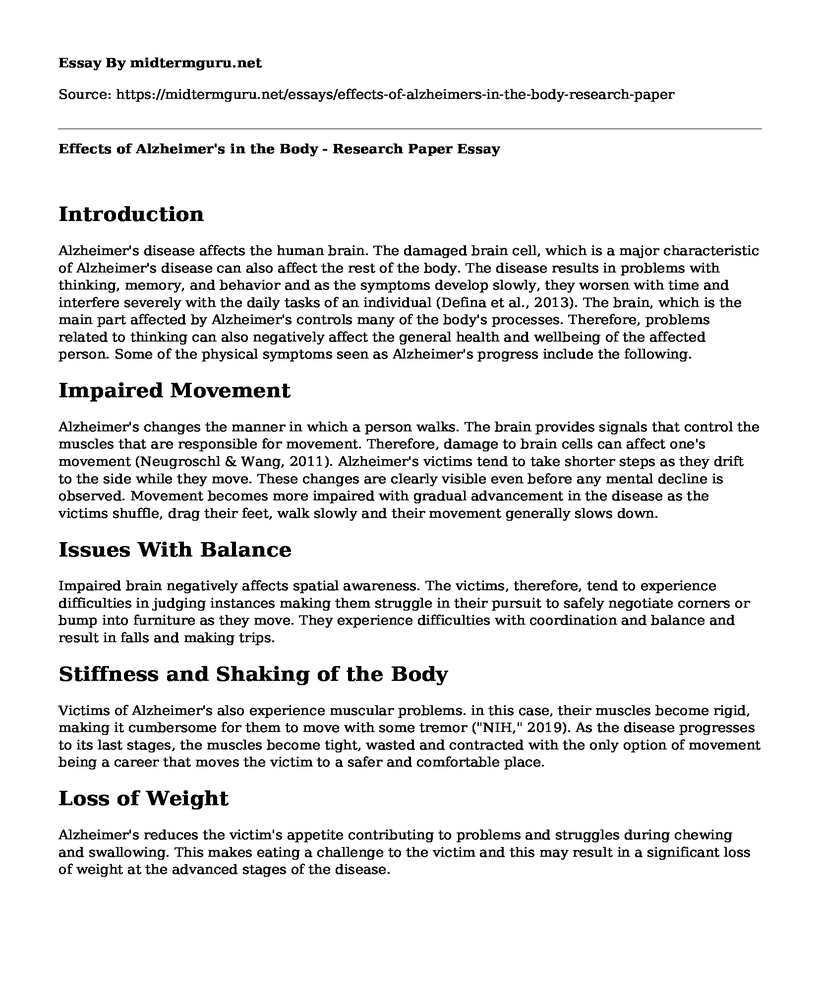Introduction
Alzheimer's disease affects the human brain. The damaged brain cell, which is a major characteristic of Alzheimer's disease can also affect the rest of the body. The disease results in problems with thinking, memory, and behavior and as the symptoms develop slowly, they worsen with time and interfere severely with the daily tasks of an individual (Defina et al., 2013). The brain, which is the main part affected by Alzheimer's controls many of the body's processes. Therefore, problems related to thinking can also negatively affect the general health and wellbeing of the affected person. Some of the physical symptoms seen as Alzheimer's progress include the following.
Impaired Movement
Alzheimer's changes the manner in which a person walks. The brain provides signals that control the muscles that are responsible for movement. Therefore, damage to brain cells can affect one's movement (Neugroschl & Wang, 2011). Alzheimer's victims tend to take shorter steps as they drift to the side while they move. These changes are clearly visible even before any mental decline is observed. Movement becomes more impaired with gradual advancement in the disease as the victims shuffle, drag their feet, walk slowly and their movement generally slows down.
Issues With Balance
Impaired brain negatively affects spatial awareness. The victims, therefore, tend to experience difficulties in judging instances making them struggle in their pursuit to safely negotiate corners or bump into furniture as they move. They experience difficulties with coordination and balance and result in falls and making trips.
Stiffness and Shaking of the Body
Victims of Alzheimer's also experience muscular problems. in this case, their muscles become rigid, making it cumbersome for them to move with some tremor ("NIH," 2019). As the disease progresses to its last stages, the muscles become tight, wasted and contracted with the only option of movement being a career that moves the victim to a safer and comfortable place.
Loss of Weight
Alzheimer's reduces the victim's appetite contributing to problems and struggles during chewing and swallowing. This makes eating a challenge to the victim and this may result in a significant loss of weight at the advanced stages of the disease.
Poor Bowel Movement and Toilet Issues
Poor eating methods and poor diet accompanied by immobility cause people with Alzheimer's to be susceptible to constipation (Defina et al., 2013). This is attributed to the natural weakening of the bowel muscles. Bad constipation results in soiling and abdominal pain. Later stages of the disease are associated with lost bowel control and inconsistency. It also results in urinary infections which are common among the frail elderly. Poor mobility, dehydration, and difficulties in washing and going to the toilet aggravate the problem. These infections contribute to the increase in confusion, abdominal pain, and incontinence. At later stages of the disease, the victim loses bladder control and this leads to continence problems.
Consistent Coughing and Chocking
Later or advanced stages of Alzheimer's disease is associated with instinctive inabilities to swallow or chew. In this case, the processes of swallowing and breathing need complex co-ordination. A compromise in any of these processes may cause the food or fluids to be inhaled into the lungs and cause dangerous aspiration pneumonia.
Conclusion
In conclusion, Alzheimer's is a progressive disease and the symptoms can be easily managed at the early stages (Defina et al., 2013). Although it may be cumbersome to prevent all the physical problems, it is vital to be aware of the potential pitfalls so as to identify the issues at an early stage and allow for participation of health professionals to enable the victims to live a happy life.
References
DeFina, P., Moser, R., Glenn, M., Lichtenstein, J., & Fellus, J. (2013). Alzheimer's Disease Clinical and Research Update for Health Care Practitioners. Journal Of Aging Research, 2013, 1-9. doi:10.1155/2013/207178
Neugroschl, J., & Wang, S. (2011). Alzheimer's Disease: Diagnosis and Treatment Across the Spectrum of Disease Severity. Mount Sinai Journal Of Medicine: A Journal Of Translational And Personalized Medicine, 78(4), 596-612. doi:10.1002/msj.20279
"NIH," (2019). Alzheimer's Disease Fact Sheet. (2019). National Institute on Aging. Retrieved from https://www.nia.nih.gov/health/alzheimers-disease-fact-sheet
Cite this page
Effects of Alzheimer's in the Body - Research Paper. (2022, Dec 21). Retrieved from https://midtermguru.com/essays/effects-of-alzheimers-in-the-body-research-paper
If you are the original author of this essay and no longer wish to have it published on the midtermguru.com website, please click below to request its removal:
- School of Nursing Scholarship Benefits
- Nutritional Planning for Preparing for Fitness - Paper Example
- Discussion Questions on Hospital Nurse Staffing and Quality of Care - Paper Example
- Essay on Obesity in Adults
- County Health Rankings: Grading US Counties on Health Status - Essay Sample
- Fight Against Drugs - Research Paper
- Patients at Risk: Inadequate Data Storage in Hospitals - Essay Sample







